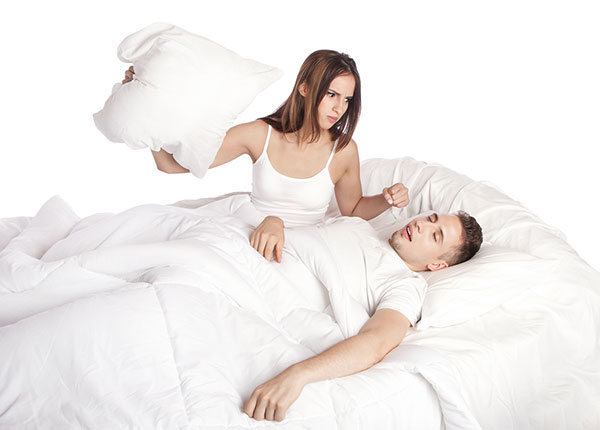
Snoring vs Sleep Apnea: What’s the Difference?
If you snore, you may have wondered if you suffer from Obstructive Sleep Apnea (OSA), a chronic condition that affects between 20 and 45 million Americans. Snoring is fairly common and, though annoying, not particularly harmful to your health. Sleep apnea, on the other hand, can lead to a range of other health problems. To properly diagnose OSA, you need to know the difference between common snoring and sleep apnea.
What is Obstructive Sleep Apnea (OSA)?
Obstructive Sleep Apnea is a medical condition in which your upper airway passages become blocked intermittently throughout your sleep, stopping the flow of oxygen until you awake and begin to breathe again. People who suffer from OSA experience this start-stop, start-stop in their sleep as many as 30 times an hour throughout the night, although they can be unaware that this is happening. Gaps in breathing can last up to twenty seconds, and it is not uncommon with OSA to awaken suddenly gasping for air.
Sleep apnea is a serious condition that can lead to numerous other health problems, ranging from high blood pressure to increased chance of disease.
Signs and Symptoms of Sleep Apnea
Though OSA suffers clearly snore, the type of snoring found in sleep apnea patients is distinctly different. In addition, because sleep apnea affects the quality of sleep one gets each night, there are a host of other signs and symptoms to look for when trying to differentiate between primary snoring and OSA.
- Loud Persistent Snoring
- Pauses in Breathing During Sleep
- Waking Up Gasping/Choking for Air
- Waking Up With Headaches
- Excessive Grogginess and Sleepiness During the Day
- Frequent Nighttime Urination
- High Blood Pressure
- Irritability and Moodiness
If you know that you snore and also suffer from many of the symptoms above, you should consult your doctor for a proper sleep evaluation. It is impossible to correctly self-diagnose sleep apnea.
Why Else Could I Be Snoring?
If none of the signs and symptoms above apply to you, it is far more likely that you are one of millions of Primary Snorers: individuals who snore on a regular basis but do not suffer from Obstructive Sleep Apnea. Which is good news, but doesn’t exactly tell you why you snore in the first place.
Snoring is caused by a blockage in the airway passages that makes it difficult for air to move smoothly in and out of your body. There are many causes of snoring, most of which are related to lifestyle choices and normal changes that occur as people age.
Aging
Normal aging causes the passageways in the throat to narrow. Muscle tone deteriorates. This leads to more frequent air blockages.
Sinus and Nasal Congestion
The buildup of mucus in the nasal passages makes it difficult for air to move smoothly through the nose and throat.
Weight Gain
Excessive tissue around the throat leads to more blockages as air tries to flow in and out.
Smoking, Alcohol and Medication
Any of these three can lead to relaxed muscles in the throat, which leads to greater chance of snoring.
Position
Your sleep position contributes to your snoring. People who sleep on their back generally experience more snoring than people who sleep on their side or stomach.
Being a Man
Men have naturally narrower throats than women, which is the primary reasons that more men suffer from snoring than women. Sorry dudes.